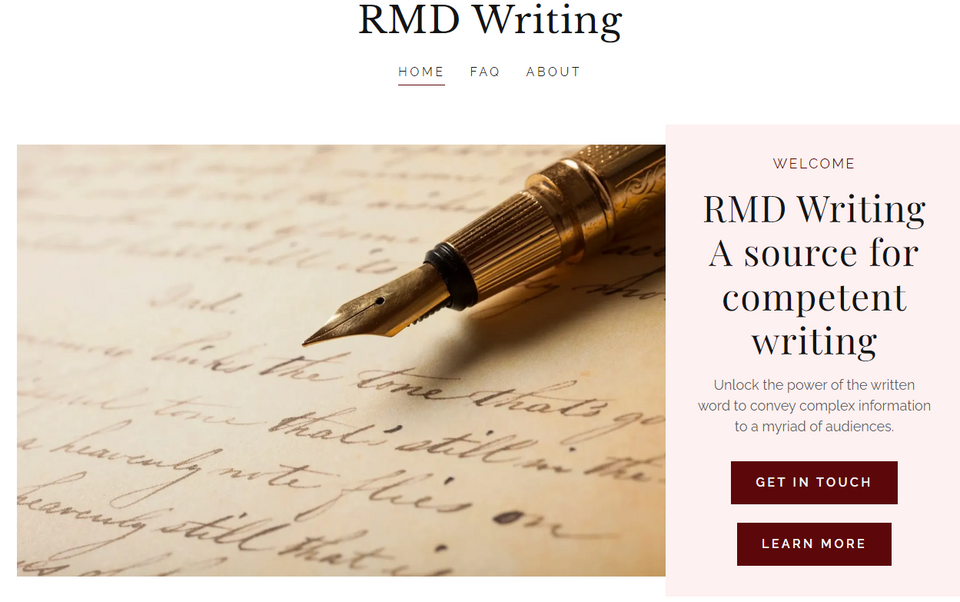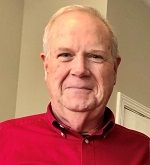My website - Intent is to be a resource for competent writing

The link and screenshot above are from the website I created this week. My email address is [email protected]. The persona I chose was that of a resource and writer of competent writing. The focus will be conveying complex technical information tailored for a variety of audiences. Of course I'm not there yet, but as we develop through this course and graduate from the program, this is the direction I may take to help leverage my experience and education.
I learned a lot this week about what can be done with a domain and a template, as well as some of the limitations. I would like to have had more options for font color and size, but there are probably methods available that I have yet to discover.
Reading Assignments
I LOVE LISTS. They provide the information I need and the structure I crave. This week's reading assignments are replete with lists providing information and methods to create professional and credible digital writing.
Dr. Lucas' "Strong Writing and Digital Literacy: What They Entail"
In his Digital Literacy for Writing section, Dr. Lucas lists skills we need to develop to be successful while writing in the digital environment. Of the 13 listed, there are four that I've highlighted:
- Advanced writing competence in adapting writing skills to the digital world is pivotal.
- Mastery of Search Engine Optimization (SEO) so your information is listed on the first page.
- Critical thinking skills to be able to discern credible sources from misinformation, as well as discern what's important and what's not so important. The link leads to "The #1 Reason for College: Learning to Think Critically (Analyzing - Evaluating - Interpreting). The strategies listed are a "must have" list to post in ones workstation. The number one issue I've had with employees over my career is their inability to think critically. It is, well, critical.
- Data privacy and Security Awareness is paramount. Having worked within the U.S. DOD network for decades, this one is ingrained in all we do. We're required to complete annual cybersecurity training. Our USB ports were disabled years ago to prevent using external storage drives. I plugged my work cell into a USB on my laptop to charge and within 10 minutes, our IT point of contact walked into my office with a message from the hub in Arizona to disconnect immediately or my account would be deactivated.
In his section on Personas, I realized I had a completely inaccurate understanding of the concept before reading this definition and explanation. The analogy that it's like character development in literature is what lit the light bulb for me. We've always been taught that when you see something repeated throughout that it should be of great importance. We see User-Centered Design (UCD) and User Experience (UX), or similar phrases, throughout all of our assignments. Considering the emotional and cognitive responses of users leading to intuitive, efficient, and enjoyable experiences from our digital environment seems like a natural goal, but articulating it keeps it structured and in the forefront of our minds. With the examples of Persona Creation (i.e., Business Traveler Bob), I couldn't help but try to think of one for myself - maybe "Reinvented Retired Randy"?
The Significance of Credibility in Writing contains very important guidance for establishing and maintaining trustworthiness and believability to be conveyed to an audience. Aristotle points out that personal character is vital to an audience seeing us as credible. Credibility mitigates misinformation, and conversely, inaccurate information discredits credibility. With my background as a geologist, the example of credibility through scientific research is near and dear to my heart. There must be an "adherence to the scientific method, rigorous peer review, and transparent reporting of findings." Far too often in today's multimedia information, pseudo-science is accepted as fact without having met any of the criteria required.
My development of practical skills for digital writers is where I am most lacking. I've always relied on the information technology subject matter experts to manage HTML, CSS, CMS, UX, and the more technical side of the page. It's where I'll increase my focus even after completing this course.
Arnold's Media Writer's Handbook, Chapter 1 - 25 Ways to Improve Writing Immediately
I chose this work because, as I said at the beginning - I LOVE LISTS! A lot of them address many of the edits I've made over the years, but people keep writing them. If you read any of the other reading assignment texts, I recommend you also read this one for its practicality. Many of them I thought were just "pet-peeves" of mine, so it's nice to be vindicated where a scholar chose to identify them. Some of the more common I've seen are listed below.
- Omit "on" before a day of the week, month, or date. YES!!!
- Avoid "holding" meetings. We hold forks and babies, not meetings.
- Avoid "talking inanimate objects". The White House can't speak. The military headquarters can't speak. Only representatives speak.
- Don't interchange feel, think, and believe. "Feel" refers to the sense of touch, state of health, or state of being. "Think" expresses an opinion. "Believe" refers to a conviction or principle.
- Put long titles (very common in government) after the person's name.
- "Doctor" is a title, not a profession. Refer to the person's profession, i.e., Doctor of Neurosurgery, etc.
- Don't presume readers know the background of the information being conveyed. This is also very prevalent in governmental writing.
- Don't report opinions and accusations as facts (even though that is a current trend in media).
- "Currently", "now", and "presently" are usually obvious and should be avoided.
I plan to share the list from Chapter 1 with everyone I can.

Comments ()